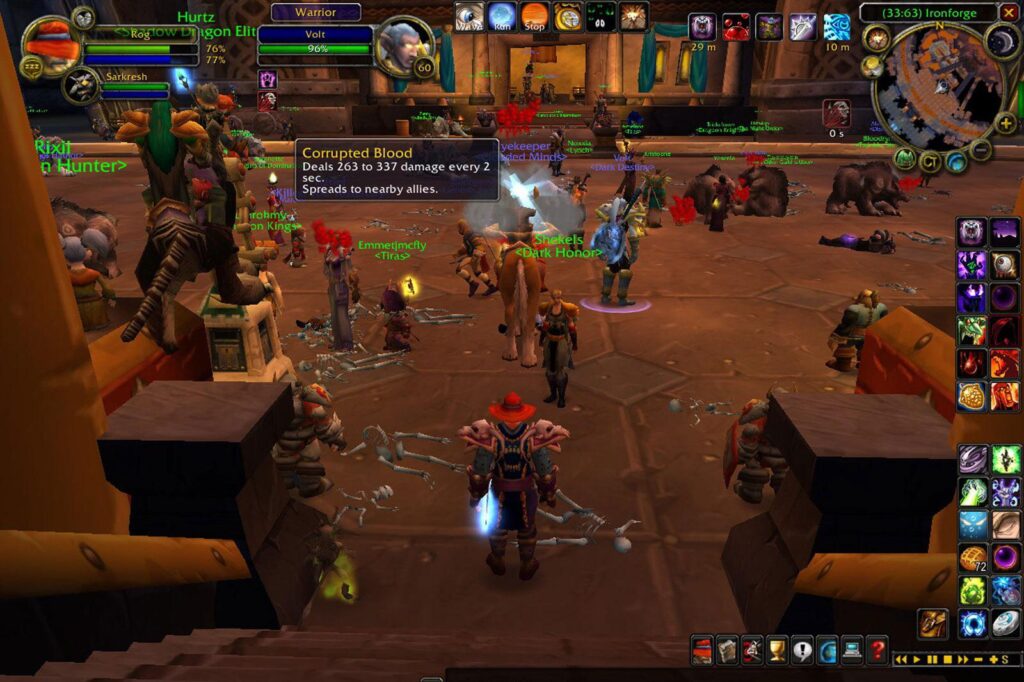
Why You Should Not Play World of Warcraft: Understanding the Risks
World of Warcraft (WoW) is one of the most iconic and influential MMORPGs (Massively Multiplayer Online Role-Playing Games) in the world. Launched in 2004 by Blizzard Entertainment, WoW has captivated millions of players with its vast, immersive world and complex lore. For many, it has been a source of entertainment, community, and even personal growth. However, while there are countless articles and testimonials about the benefits of playing WoW, it’s important to acknowledge that it’s not for everyone. There are risks as to why you might want to think twice before diving into the world of Azeroth.

Risks: Time-Consuming Nature
One of the most significant risks associated with playing World of Warcraft is the sheer amount of time it demands. WoW is notorious for its addictive nature, with players often finding themselves spending hours, if not days, immersed in the game, exploring its world, completing quests, and leveling up their characters. What begins as a casual hobby can rapidly escalate into an all-consuming passion.
The game’s design amplifies these risks by encouraging extensive time investments for progression. Raids, dungeons, and PvP (Player vs. Player) battles can take hours to complete and often require substantial commitment from all participants. For those juggling busy lives, careers, or family responsibilities, this time investment can quickly become overwhelming. It’s easy to find oneself neglecting real-life duties in favor of completing just one more quest or earning that next piece of epic gear.

Risks: Potential for Addiction
WoW is designed to be addictive, which is one of its significant risks. With its endless content, frequent updates, and rewarding progression system, the game continuously offers players something to strive for. The satisfaction from leveling up, acquiring powerful gear, and defeating challenging bosses can be enticing but also fosters a cycle of addiction.
For some, these risks can have serious consequences. Relationships, work, and personal health can all suffer due to excessive play. The game’s social aspects, like guilds and in-game friendships, can further entrench players, making it challenging to step away even when they recognize the need to. In extreme cases, players have lost jobs, relationships, and even their health due to their inability to manage their gaming habits.

Risks: Financial Costs
While World of Warcraft is a subscription-based game with a monthly fee, the financial risks extend well beyond that. The game frequently releases expansions, each with its own price tag, and offers various in-game purchases such as mounts, pets, and character boosts. These additional costs can accumulate quickly.
For some players, these financial risks can spiral out of control. The urge to remain competitive or to acquire the latest cosmetic items can lead to spending far more than initially planned. Over time, the financial burden of playing WoW can become substantial, particularly for those on a tight budget.

Impact on Mental Health
The immersive nature of World of Warcraft can have a profound impact on mental health. While gaming can be a great way to escape from stress and anxiety, for some, it can exacerbate these issues. The game’s social environment can sometimes be toxic, with players experiencing harassment, bullying, or exclusion.
Moreover, the pressure to succeed in the game, whether it’s reaching the highest levels, obtaining rare items, or achieving top rankings in PvP, can lead to feelings of inadequacy and frustration. For those prone to anxiety or depression, WoW can sometimes become a negative influence, contributing to a decline in mental well-being.

Loss of Social Interaction
While WoW is a social game, with players forming guilds, joining raids, and participating in in-game events together, it can also lead to a loss of real-life social interaction. The game’s online communities can become a substitute for real-world relationships, leading to isolation from friends and family.
For some players, the friends they make in-game become their primary social circle, which can be fulfilling but also limiting. Over time, the lines between online and offline relationships can blur, leading to a diminished ability to connect with people in the real world. This isolation can have long-term effects on one’s social skills and overall quality of life.

Stagnation in Personal Growth
World of Warcraft can offer a sense of achievement and progress, but it can also lead to stagnation in real-life personal growth. The time and energy invested in the game might come at the expense of pursuing real-world goals and ambitions. Education, career advancement, and personal development can all take a backseat to the game’s demands.
For younger players, this can be particularly concerning. The formative years of one’s life are crucial for building skills, knowledge, and experiences that will shape the future. Spending these years immersed in a virtual world can result in missed opportunities and delayed maturity.

Overemphasis on Virtual Success
In WoW, success is often measured by one’s in-game achievements: the level of your character, the rarity of your gear, or your standing in PvP rankings. While these accomplishments can be satisfying, they can also create a distorted sense of self-worth. Players may begin to equate their value with their in-game success, leading to an overemphasis on virtual achievements at the expense of real-world accomplishments.
This skewed perspective can affect self-esteem and lead to an unhealthy obsession with the game. The pursuit of in-game success can overshadow the importance of real-life achievements, leaving players feeling unfulfilled when they step away from the game.

Content Fatigue
World of Warcraft is known for its vast amount of content, but this can also be a double-edged sword. The game is constantly updated with new expansions, quests, and challenges, which can lead to content fatigue. Players may find themselves overwhelmed by the sheer volume of things to do and experience, leading to burnout.
Additionally, the game’s content can become repetitive over time. Grinding for gear, completing daily quests, and participating in the same raids week after week can start to feel monotonous. For those who value variety and novelty, WoW’s content loop can become tiresome, leading to a loss of interest in the game.

Impact on Physical Health
The sedentary nature of playing World of Warcraft for extended periods can have negative effects on physical health. Sitting for long hours in front of a computer screen can lead to a range of health issues, including back pain, eye strain, and weight gain. Additionally, the lack of physical activity can contribute to a sedentary lifestyle, increasing the risk of conditions such as obesity, diabetes, and cardiovascular disease.
For some players, the game’s addictive nature can make it difficult to maintain a healthy balance between gaming and physical activity. Neglecting exercise, proper nutrition, and sleep can have serious consequences for one’s overall health and well-being.

Difficulty in Quitting
One of the most challenging aspects of World of Warcraft is knowing when to quit. The game is designed to keep players engaged, with new content, events, and challenges constantly being added. Even when a player decides to take a break or quit altogether, the temptation to return can be strong.
The game’s social aspect can also make it difficult to step away. Players may feel a sense of loyalty to their guilds or in-game friends, making it hard to leave the game behind. The fear of missing out on new content or falling behind others can also pull players back in, even when they know it’s time to move on.

World of Warcraft is undoubtedly a masterpiece of game design, offering a rich and immersive experience that has captivated millions of players worldwide. However, it’s important to recognize that it’s not without its drawbacks. The time commitment, potential for addiction, financial costs, and impact on mental and physical health are all significant concerns that should not be overlooked.
For those who can manage their time effectively, set boundaries, and maintain a healthy balance between gaming and real life, WoW can be a rewarding experience. However, for others, the risks may outweigh the benefits. If you find yourself struggling with any of the issues mentioned above, it may be time to reconsider whether World of Warcraft is the right game for you. After all, the most important game you’ll ever play is the game of life, and it’s crucial to ensure that you’re playing it well.